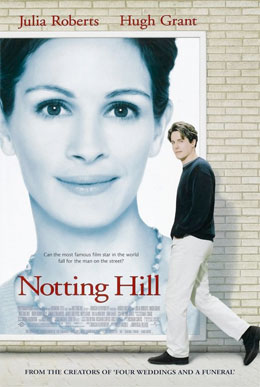The 1999 film follows a complicated relationship with a philosophical flair
By BRIAN RILEY — bkriley@ucdavis.edu
What would you do if a superstar celebrity came into your life while you were going about your regular, humble routine? Would you carry on normally and attempt to engage in casual banter with the star, knowing that you’d probably never meet again?
Such is the situation at the beginning of the classic film “Notting Hill,” which is now back in movie theaters, when a small bookstore owner in London named William (played by Hugh Grant) looks up from his cash register to see that the ultra-superstar American movie actress Anna Scott (played by Julia Roberts) is quietly browsing for travel books in his store. He offers to help, sparks fly, she leaves; a happy accident then occurs on the streets that brings them together again and a problematic romantic relationship ensues.
Some problems, like those of this new romance, are good problems, and very good ones indeed. William’s wife had recently divorced him for superficial reasons. He is living with a seemingly wildly inconsiderate but paradoxically well-meaning roommate named Spike (played by Rhys Ifans), a self-employed, very unkempt artist with a low-to-nonexistent income, and he was bored with his bookshop and feared that his business was failing.
From Anna’s perspective, her preexisting relationship with her movie star boyfriend had been quickly fading, or perhaps had never really gotten off the ground in the first place, and she was experiencing something of a personal slump, doubting her acting abilities and future acting prospects.
How could these two interesting characters find a way to adjust to each other so that their fledgling and prospective relationship could blossom into a real and lasting one? The ending of the film only hints at how they might have accommodated each other on a long-term basis, showing a peaceful scene of the two of them in a park in the backyard of their newly purchased, upscale home, thus leaving plenty of questions left unanswered, creating assundry possibilities for an eventual sequel.
In the meantime, though, in the story being told, it’s Will and Anna’s differing processes of solving their pressing intermediate conflicts that create interest. Anna has no apparent qualms with jerking his emotions violently from one extreme to another. William, in a typical British way, prefers an even-keel approach to life, but knows he would have to give that up in order to be with her. Although William owns a travel bookshop, he has never been able to venture out and explore the world as he had originally intended. Now is his chance. Anna, by contrast, has been on a burdensome low-calorie diet since age nineteen and craves a meaningful home life.
Both characters also experience a strong “meta” component in their daily lives, Anna obviously so due to her fame and needing to find ways to examine and understand her own fame and navigate through its complexities. Will, we can infer, took literature classes as part of his studies at university and so understands the meta function that narration plays in novels, which evolved in interaction with industrialization and the onset and development of the Modern Age.
For those who have not yet seen the movie, I’ll leave out the details of the incredible scene where the plotline takes an unexpected turn, with both Julia Roberts and Hugh Grant giving the performance of their lives — cinema perfection — uttering writer Richard Curtis’s ingenious lines under the masterful direction of (the now recently deceased) director Roger Michell. In this simple yet effective dialogue, the unconsciously authentic aspects of life mix with the type of meta posturing that we all engage in these days and blend together with all the various and intriguing plot points.
Philosophy, of course, is the ultimate form of the meta in life — the ultimate integrator — and this movie has a strong philosophical feel, all the way from Will’s opening voice-over narration, through the scene where Will and his best friend Max (played by Tim McInnerny) discuss the Greek gods, to the unpredictable climax where Richard Curtis sweeps us all away with another master-stroke of dialogue combined with meta-dialogue.
The movie was twenty years ahead of its time, but it leaves us wanting to know more, not only for entertainment purposes but also as a guide to how we might make needed compromises and breakthroughs in today’s world. A romantic relationship is the ultimate social form of unity in diversity, but when one partner ends up only serving the needs and desires of the other, unity goes astray. When both partners’ goals diverge too starkly, that degree of diversity breaks them apart. The content and style of the movie cries out for a sequel, which will hopefully be forthcoming.
With all this in mind, the thoughtful viewer can come out of the movie experience charged with ideas and questions in the way that the artist, or artists in this case, intended. And this truly is great art.
If you’re interested in appreciating it on the big screen, the film is showing Wednesday, Feb. 9 at Regal Theaters in Sacramento.
Brian Riley has written two previous guest movie reviews for The California Aggie, one on Paddington 2 and another on the movie Yesterday. He is in a transition phase, academically, and hopes to find a new advisor and dissertation chair in order to be able to switch to Independent Major (PhD) status, with a focus on Philosophy and University Studies. He can be contacted at bkriley@ucdavis.edu.
Written by: Brian Riley — Guest Writer




